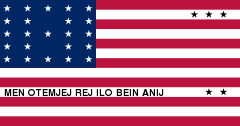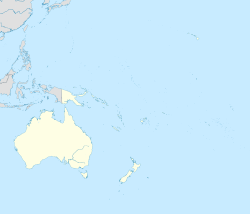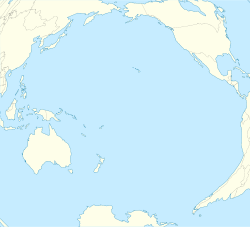Bikini Island
|
Bikini Atoll Pikinni Atoll |
||
|---|---|---|
| Atoll | ||

Bikini Atoll. On the northwest cape of the atoll, adjacent to Nam island, the crater formed by the 15 Mt Castle Bravo nuclear test can be seen, with the smaller 11 Mt Castle Romeo crater adjoining it.
|
||
|
||
 Map of the Marshall Islands showing Bikini |
||
 Map of Bikini Atoll |
||
| Location of Bikini Atoll | ||
| Coordinates: 11°35′N 165°23′E / 11.583°N 165.383°ECoordinates: 11°35′N 165°23′E / 11.583°N 165.383°E | ||
| Country | Republic of the Marshall Islands | |
| Area | ||
| • Land | 6 km2 (2.3 sq mi) | |
| Population | ||
| • Total | 5 caretakers | |
| Native population relocated in 1948. | ||
| UNESCO World Heritage Site | ||
| Criteria | Cultural: (iv), (vi) |
|
| Reference | 1339 | |
| Inscription | 2010 (34th Session) | |
|
[]
|
||
Bikini Atoll (pronounced /ˈbɪkɪˌniː/ or /bɪˈkiːni/; Marshallese: Pikinni, [pʲi͡ɯɡɯ͡inʲːii̯], meaning coconut place) is an atoll in the Marshall Islands which consists of 23 islands totaling 3.4 square miles (8.8 km2) surrounding a deep 229.4-square-mile (594.1 km2) central lagoon. It is at the northern end of the Ralik Chain, approximately 87 kilometres (54 mi) northwest of Ailinginae Atoll and 850 kilometres (530 mi) northwest of Majuro. Within Bikini Atoll, Bikini, Eneu, Nam, and Enidrik islands comprise just over 70% of the land area. Bikini and Eneu are the only islands of the atoll that hosted a permanent population. Bikini Island is the northeastern most and largest islet. Before World War II, the atoll was known by its German name, Eschscholtz Atoll.
The island's English name is derived from the German colonial name Bikini given to the atoll when it was part of German New Guinea. The German name is transliterated from the Marshallese name for the island, Pikinni, ([pʲi͡ɯɡɯ͡inʲːii̯]), Pik" meaning "surface" and "Ni" meaning "coconut", or surface of coconuts.
...
Wikipedia



